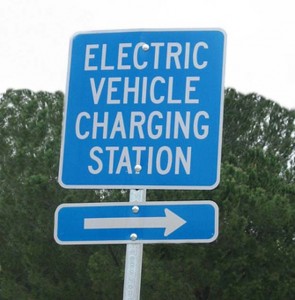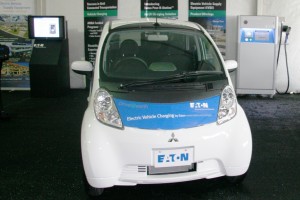A new study by a Texas firm indicates that demand for electric vehicles will create a multi-billion business for charger manufacturers before the end of the decade.
Verify Markets of San Antonio, Texas declares, in a market research report, that the North American electric vehicle charging industry will grow rapidly over the next five to seven years, reaching $3.09 billion by 2017. (See 15 Minute Recharging Underway for Electric Vehicle Owners from Eaton and Murphy Oil)
“The key factors that are driving the sale of EVs, and in consequence EV charging equipment, are the low costs to operate and maintain an electric vehicle, the desire for countries to be energy independent and more green, and advances in technology. This includes better performing batteries and improved charger to grid/vehicle to charger communications, which make this industry possible,” the report said.
One factor that will help the growth of the industry is the adoption of uniform standards for such things as the plugs used by various vehicles and chargers. This interchangeability is already in place for 110-volt and 220-volt chargers and is expected to be adopted for high-speed, 440-volt chargers, as well, over the next several years.
That means that while individual automakers may form relationships with specific charger manufacturers – Nissan with Aerovironment, for example – it would be possible for a consumer to switch from one battery car to another, such as a Nissan Leaf to a Chevrolet Volt, without changing out chargers, as well. That is expected to spur greater acceptance of battery power.
The market is expected to reach unit shipments of 2.8 million by 2017, with over 85% of unit sales comprised of residential and multi-unit housing chargers, according to the Verify Markets report. But other observers believe that there could be a significant commercial market opening up to challenge the well-entrenched gasoline service station infrastructure.
Nissan, for one, has been working with a variety of partners, in the U.S. and abroad, to set up high-voltage fast-charging stations that would obviate some of the range limitations of current battery drive systems. Automotive supplier Eaton has announced, meanwhile, plans to team up with Murphy Oil USA to set up a network of 500-volt rapid chargers at service stations across the country. The technology would be capable of delivering 15-minute “refills.”
(For more on the Eaton/Murphy project, Click Here.)
The big push into electrification is expected to get underway late this year, with the introduction of the Leaf and Volt, a pure battery-electric vehicle and plug-in hybrid, respectively. Major automakers like Ford, Toyota, Honda and Daimler’s Mercedes-Benz and Smart brands will quickly follow. An assortment of start-up battery makers, including Tesla Motors, Fisker Automotive, Bright Automotive and Amp, also hope to drive demand.
That, says Verify, will encourage a rush by charger makers, over the next two to three years, when several major electronic and electrical equipment providers, including ABB, General Electric, Eaton, and Leviton, are expected to stake a presence in the market.
Greater competition will increase the downward price pressure of EV chargers. This will likely decrease unit price by 50% in three to five years, according to the new report.
While the study could seem outlandish to battery car skeptics, it’s basically in line with predictions that global sales of new battery electric and plug-in electric vehicles could reach 500,000 units annually in the 2013 to 2015 time range as government incentives around the world jump start EV sales.
Proponents see even more dramatic opportunities. Nissan CEO Carlos Ghosn has estimated that battery-based vehicles could reach as much as 20% of the global market by decade’s end – perhaps as much as 16 million plug-ins and BEVs based on forecasts for the growth of overall automotive demand.
Paul A. Eisenstein contributed to this report.


